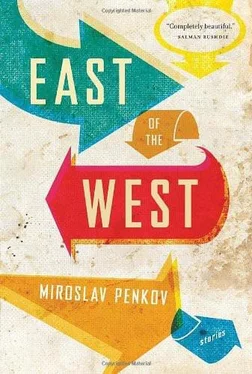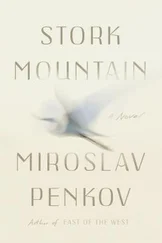Our father was a bitter man, having to kiss his in-law’s hand before each meal. Father beat us plenty with his chestnut stick and I remember him happy on a single day in 1905, when we celebrated twenty years since the North had been united with the South. He sat me down with my brother, poured each a mortar of red wine and made us drink to the bottom, like men. He told us that when next we got our Macedonia back he’d fill the mortars up with rakia .
Father was lost in the Balkan war, seven years after. I’d like to think he fell near Edirne, a heroic death, but I won’t blame him if he just chose not to return. I hope he rests in peace. When Grandpa died, it fell to me and Brother to care for the women. We worked the fields of others, cut hay, herded the village sheep. And everyone spoke of a new war, bigger than the Balkan, and that war, too, at last, reached our village. Men with guns set up camp on the square, recruiting soldiers. They said all boys of such and such age had to enlist. They said if we helped Germany win, the Germans would let us take back the land that Serbs, and Greeks, and Romanians had stolen from us after the Balkan wars. The Germans would even let us take Macedonia back from the Turks and be complete once and for all. Our mother wept and kissed my hands and then my brother’s. She said, “I can’t lose both my sons in this war. But I can’t let you hide and shame our blood.” She sent the twins to milk two sheep, then put a copper of milk before me and one before my brother. Whoever drank his copper first would get to stay home and run the house. The other would go to war. I drank as though I’d never drink again. I chugged. I quaffed. I inhaled that milk. When I was done, I saw my brother had barely touched lips to his.
Dear God. Why now? Have I no other worries? I lie and I remember and listen to the falling snow from this old and foolish letter. I feel the cold of the mountain and see my brother holding that copper still full of liquid snow. For heaven’s sake, Brother. Drink.
•
After breakfast I help Nora put on her robe — the limp arm first, then the good one. I comb her hair and I talk to her like this: Did you sleep well, my dear? Did you have good dreams? Did you dream of me? I dreamed of crossing mountains and fighting Turks.
She looks confused. I help her to her feet. She smiles. Is this a loving smile? Or is she simply grateful for the help? We start slowly down the hallway, two cripples who use one another as crutches. We make a circle in the yard and then sit on a bench.
I say, “I never was a tactful man,” and pull the little book of letters from my woolen jacket. I lay it on her knees. “I know about all this,” I say. “I know that he loved you and that you loved him, too. This was before my time, of course, but God, Nora, I wish you’d told me. Why did you never tell me? At seventy-one, I’m not supposed to envy the dead.”
I try to smile, but Nora’s eyes are on the letters. She brushes the cover with a finger and it just now occurs to me that since her first stroke she hasn’t held this book; that most likely, she’d reconciled with the thought of never reading his words again.
Why not? I turn the pages and clear my throat. Let this dead lover of my wife’s come to existence once more, for her sake, if only for a day. Let me, her husband, lend him my living lips.
February 6, 1905My dear, lovely Nora. Today as we waded through knee-deep snow along the Bulgarian ridge of the Pirin Mountains we saw smoke rising from behind a boulder. We drew out our pistols, ready to spill some Turkish blood, but instead found a man and his woman, huddled by a tiny flame. They’d torn the man’s shirt and burned strips of it to get warm. His nose was broken and the blood had turned black from the cold. The woman’s face had been cut by a knife. I took my cloak and gave it to her for a while. Please forgive. The Voivode had us build a proper fire and boil some tea and while we waited for the water the man told us their story. They came from the other side of the border, these two, from some village in Macedonia. They had a small house there, a little boy of five. Two days ago a band of komiti, Bulgarians like us who’d gone to fight for Macedonia’s freedom, passed through the village. Maybe afraid to anger the komiti, maybe out of kindness, these good people sheltered them in their house. The komiti slept, ate, drank (maybe a little too much), gathered strength and were ready to go on their way when, out of nowhere, a poterya, a pursuit party, arrived in the village. No doubt some local coward had betrayed our brothers. There was much shooting and much blood, Nora, that’s what the man told us. When the Turks were finished, they dragged the komiti out in the yard, already dead, mind you, and chopped their heads off just for show. Impaled them on sticks for everyone to see. Then they took these two people’s boy and promised to turn him Turk, so when he grew up he’d come back for the heads of his own folk.Do you see now, Nora, why I’ve left you? Why, instead of your breast, it’s stones and frozen mud and that cur the mountain that my head has to rest on? I curse the Turks, and the traitors, and all the cowards back home who choose their women before their brothers.And with them I curse myself, Nora. I wish I, too, was a coward .
It’s hard for me to finish the letter, and then, after I’m done, we sit in silence. I’d really like to see Nora’s reaction, but all the same I find no strength to look her in the eye. I’ve always been good at looking away.
•
Our daughter comes to visit in the afternoon. Pavel is trotting behind her. He hangs on my neck and gives me a kiss. “Dyadka , how goes it?”
“Don’t call your Grandpa ‘dyadka,’ “ Buryana scolds him. “It’s disrespectful.”
He runs to kiss his grandma.
“Dyadka,” I call him back to my side. “Come show me those muscles of yours.” Proudly he flexes his tiny arm. “Like steel,” he says. And then he tells me to flex my arm. “Like jelly!” He jumps on my bed, shoes still on, and bounces off the squeaking springs.
Nora, like me, is smiling. But Buryana tells Pavel to go tell his grandma a fairy tale he’s learned and drops beside me on the bed. She brushes the blanket and smooths it down. She nods at her mother. “You think we can talk?”
“As deaf as a grouse, that one,” I say, “while I myself … I’m the ears of this world.”
“Please, Father. I’m not in the mood.”
That’s a surprise, I think. And hush now. I, too, want to hear the fairy tale. But she goes on.
“I followed your advice and spoke with him,” she says. She keeps on talking softly, and for once my mind gives up on sound. I suddenly remember how, as a little girl, she loved to ride her bike along the narrow sidewalk curb, despite my word against it. I’d make her promise me she wouldn’t perform such risky stunts and she would say, “I promise, taté !” and only then I’d let her take out the bike. One day she stood at the doorway with a bloodied chin. She looked at me, fighting the tears as hard as she could. “I’m fine, you see,” she tried to say. “No big deal, that fall.” I held her, kissed her, and only then did she give in to them.
She is like this now, telling me about her husband. So many years later, my mouth fills up once more with that taste — Buryana’s blood and tears.
“What did I tell you, just now?” she suddenly says. “Are you listening at all?”
“Of course I am. You spoke with your husband. He said he needed time to think.”
“To think!” she says. “So I’ve decided we’re staying here tonight. And maybe tomorrow.”
I take a moment to think it over. This is such a little room, and even Nora’s breathing floods it to the brim with noise at night. And now — two more people breathing, and tossing, and those creaking springs. This means no sleep, I know. Which means remembering the past. But what’s an old dyadka like me supposed to do? And so I call the nurse and after a little fussing she brings two extra cots.
Читать дальше











